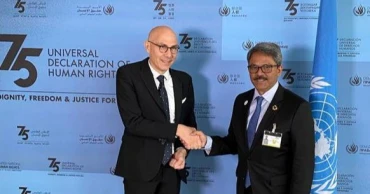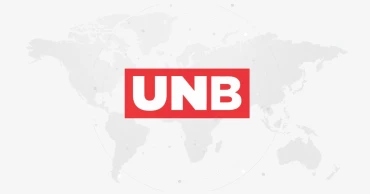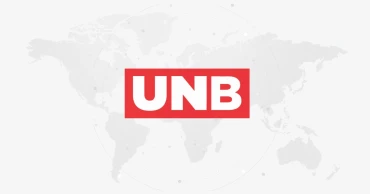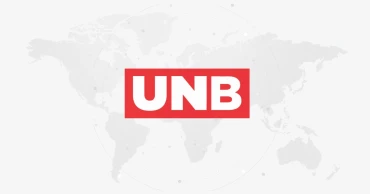Joint Response Plan
Rohingya repatriation top priority in JRP 2023, US$ 876m sought
State Minister for Foreign Affairs Md. Shahriar Alam has called for robust international efforts to expedite repatriation of the forcibly displaced Rohingyas sheltered in Bangladesh to their homeland Myanmar.
With its limited resources and inadequate external support Bangladesh has to continue the humanitarian operation until the repatriation process for over one million Rohingyas is complete.
In this context, the State Minister urged the international community to contribute generously to the humanitarian aid fund for them.
He made the appeal while addressing the launching of Joint Response Plan (JRP) 2023 for Rohingyas in Geneva on March 7.
Also Read: JRP 2023 launched: IOM in $125m appeal for Rohingyas, hosts
The State Minister also requested all humanitarian partners to prioritize sectors covering the basic necessities like food, health, site management and shelter, etc. in their assistance.
Recalling that Prime Minister Sheikh Hasina had opened the borders of Bangladesh to save the lives of Rohingyas back in 2016 and 2017 despite its serious ramification on the economy, environment, security, and socio-political stability of Bangladesh, State Minister Alam briefed the audience of Bangladesh’s numerous efforts, including development of Bhasan Char with its own resources to improve the living standards of the Rohingyas, ensure their education, and skills development opportunities.
Mentioning that Bangladesh is the largest donor, spending around 1.69 billion USD last year for the massive humanitarian operations for Rohingyas, ensuring safety and security in and around camps, restoration of the environment, and mitigation of sufferings of the Rohingyas and the host community, State Minister Alam warned that the impasse over commencing return of the Rohingyas to their home country might affect the security and stability of the entire region and jeopardize development initiatives.
Repatriation has been mentioned as the top priority in JRP 2023.
Also Read: UNHCR, partners seek $876m for Rohingyas facing uncertainty, Bangladeshi hosts
Under JRP 2023 an amount of USD 876 million has been sought and a chapter on Bhasan Char has been added.
The State Minister recalled that 62.7% of the pledged amount under JRP 2022 was funded and it was quite challenging to meet the needs of the growing Rohingya population and mitigate the sufferings of the host community in Bangladesh with the received donation.
He also said that the Ukraine War and other multiple crises have worsened the funding crisis for Rohingyas.
The State Minister expressed concern over the disinformation or biased projection of the government’s efforts to arrange education, skill development initiatives and even improve the security situation for the Rohingyas in Bangladesh.
Read More: US announces $26m more in assistance for Rohingyas, host communities
He also remarked that uncertainty to commence repatriation is often being used as a domestic political tool by opposition parties in Bangladesh, projecting it as a failure of the present government.
The State Minister urged all to check the ground reality prevailing in Bangladesh and talk to the government before relying on those “concocted stories”.
Co-sponsored by the UNHCR and IOM, the JRP for the Rohingya humanitarian crisis was attended by ambassadors/permanent representatives of member states of the UN, representatives of NGO, INGOs, media, academician, and officials of UN bodies.
Appreciating Prime Minister Sheikh Hasina’s generosity in allowing Rohingyas to take shelter in Bangladesh and various efforts of Bangladesh including education for forcibly displaced Rohingyas, UN High Commissioner for Refugees and Director General of the International Organization for Migration also called upon the international community to provide increased humanitarian assistance for the Rohingyas in their dire need.
Read More: Rohingya crisis not forgotten: EU high representative
They also acknowledged that repatriation is key to resolving the Rohingya crisis and Myanmar has to demonstrate political will to that end.
The EU, US, Norway, Switzerland, Australia and some other donor countries announced their respective contributions for the Rohingyas for 2023 in the JRP event.
The State Minister also met with High Commissioner for Human Rights Volker Turk at the UN Office in Geneva and briefed him of the efforts made by the government under the dynamic leadership of Sheikh Hasina to promote and protect human rights of all. He reiterated the government’s commitment to consistent engagement with the UN human rights mechanisms.
The State Minister briefed the High Commissioner about Rohingya camp situations in Cox’s Bazar and the newly built Bhasan Char shelter.
Read More: BURMA Act: Military support to ethnic armed groups in Myanmar 'may undermine' Bangladesh’s security
He emphasized burden sharing by the international community and its stronger commitment to their right to return and to ensuring justice and accountability for them.
High Commissioner Volker Turk applauded Bangladesh’s outstanding advancements in socio-economic arena, and its engagement with UN mechanisms. He praised Bangladesh’s humanitarian leadership in sheltering Rohingyas and efforts to advance world peace.
2 years ago
Focusing on repatriation; Bhasan Char temporary plan: Shahriar
State Minister for Foreign Affairs M Shahriar Alam on Monday said Bangladesh has been able to establish two things in the Joint Response Plan (JRP) -- focus on Rohingya repatriation as a solution and making sure that Rohingya relocation to Bhasan Char is a temporary arrangement until repatriation takes place.
“We could reestablish two things in this JRP -- one is repatriation while another one is that we didn’t allow it (Bhasan Char) to become a permanent mechanism,” he told a small group of journalists, including the UNB correspondent, at his office.
He said the Bhasan Char issue will be there in the 2021 Joint Response Plan (JRP) but the details will be known after its formal launching tomorrow (Tuesday).
Shahriar said additional funding will be sought once the relocation process at Bhasan Char is completed as the government has a plan to shift 100,000 Rohingyas there from Cox’s Bazar’s congested camps.
So far, around 20,000 Rohingyas have been relocated to Bhasan Char under the government arrangement, said the State Minister.
He said the technical committee and the major contributors of the JRP said positive things about Bhasan Char.
When the UN will formally take up the responsibility of Rohingyas at Bhasan Char, it will further be evaluated how much funding will be required. “The final decision will be given by the UN.”
Shahriar said Bangladesh is focusing on repatriation and Bhasan Char is a temporary arrangement though many tried to make it a permanent mechanism.
“We could reestablish two things in this JRP – one is repatriation while another one is that we didn’t allow it (Bhasan Char) to become a permanent mechanism,” he said.
Meanwhile, US Ambassador to Bangladesh Earl R Miller met State Minister for Foreign Affairs M Shahriar Alam in the Ministry of Foreign Affairs.
They exchanged views on number of global and bilateral issues, including the launching of the annual Joint Response Plan (JRP) for the humanitarian operations for displaced Rohingyas, the Israeli-Palestinian conflict, the COVID situation and vaccine issue.
“They’re trying so that a senior US official can virtually join the launching event from Washington,” Shahriar said, adding that it is the reflection of US’ continuous support towards Bangladesh on repatriation and rehabilitation of Rohingyas.
The US Ambassador informed that the US would again be the largest contributor to the JRP for Rohingyas, which will be virtually launched and will attended by State Minister Shariar Alam.
He also stated that the US would continue its support to Bangladesh in bearing the burden of the displaced population.
The State Minister emphasised that sustainable repatriation of the Rohingyas remains as the priority of Bangladesh, and also emphasised receiving international support for the displaced Rohingyas relocated to Bhashan Char.
The US$943 million plan seeks to meet the needs of more than 880,000 Rohingya refugees and 472,000 Bangladeshis in the surrounding host communities in Cox’s Bazar district.
Most Rohingya refugees, some 740,000, fled violence in Myanmar’s Rakhine State in 2017.
UNHCR, the UN Refugee Agency, has called for renewed international commitment, support and solidarity for Rohingyas ahead of next Tuesday’s donors’ conference.
The 2021 JRP brings together the efforts of the Government of Bangladesh, and 134 UN agencies and NGO partners to target almost 1.4 million people this year, said UNHCR spokesperson Andrej Mahecic in Geneva recently.
Jointly co-hosted by the Government of Bangladesh, the International Organization for Migration (IOM) and UNHCR, the virtual 2021 JRP launch event will highlight the most immediate needs and ongoing humanitarian response.
The virtual 2021 JRP launch event is scheduled to run from 10:00am to 12:00 pm CEST Geneva (2:00pm – 4:00pm GMT+6 in Dhaka; 3:00pm – 5:00pm GMT+7 in Bangkok) on Tuesday (May 18). The event will be live streamed.
Last year, the United Nations appealed for more than US$1 billion to meet the needs of the Rohingya refugees and host communities in Cox’s Bazar District.
At the end of 2020, this appeal was just 59.4% funded.
"We stress that the international community must not only maintain support for refugees and their hosts, but also adapt to new and emerging needs and pursue the search for durable solutions," said the spokesperson.
More than 880,000 Rohingya refugees and 472,000 Bangladeshis in the surrounding host communities in Cox’s Bazar District are brought under the plan.
Also read: Miller discusses JRP, bilateral issues with Shahriar
Most Rohingya refugees, some 740,000, fled violence in Myanmar’s Rakhine State in 2017.
With the refugee crisis in its fourth year, Bangladesh needs robust and sustained international support to ensure the safety and wellbeing of stateless Rohingya refugees, said Mahecic.
This must not become a forgotten crisis. Both Rohingya refugees and Bangladesh, having generously hosted them for decades, must see the world standing with them, said the Spokesperson.
Adding to the complexity of this crisis, the Covid-19 pandemic has compounded vulnerabilities for refugees and host communities alike.
To date, the government of Bangladesh, with the support of the humanitarian community, has effectively managed the Covid-19 response and the spread of the disease in the Rohingya camps and surrounding areas, though the trajectory of the virus remains unpredictable, UNHCR said.
A coordinated and inclusive response has saved lives. However, it is critical to ensure the continued delivery of all humanitarian assistance and protection services.
The needs of Rohingya refugees reach beyond subsistence and physical safety. Refugees, like any other people, cannot be allowed to wait for years without access to education and options for a decent life and a meaningful future.
In order to mitigate the risks of people taking dangerous onward journeys, more must be done to ensure that refugees have hope in Bangladesh, and of a future back home in Myanmar.
Otherwise, they may increasingly risk such journeys by land or sea to find a solution elsewhere.
The search for durable solutions must remain focused on the voluntary, safe, dignified and sustainable return of Rohingya refugees to their homes in Myanmar, when conditions allow them to do so.
Also read: Ensure women’s participation in all peace initiatives: Shahriar
However, the ongoing crisis and political instability in Myanmar have added new layers of complexity to this challenge.
4 years ago
Rohingya response: Cox's Bazar NGOs for transparency, localisation
Local NGOs working in Cox's Bazar sought transparency and localisation of Rohingya response management ahead of the launching of the Joint Response Plan (JRP) 2021 on May 18.
The $943 million plan brings together the efforts of the government of Bangladesh, and 134 UN agencies and NGO partners, targeting 880,000 Rohingya refugees and 472,000 Bangladeshis in the surrounding host communities in Cox's Bazar, the UN said Friday.
However, opinions of the locals had little reflection in the document prepared by UN agencies, Cox's Bazar CSO NGO Forum said Sunday.
Read Bangladesh to demand 10pc of funds for Rohingyas in Bhasan Char: FM
In the last four years, the Inter Sectoral Coordination Group (ISCG) rarely came up with any statistics on how much fund had gone to host communities, how much had been used for local procurement and the number of local staff employed, Rezaul Karim Chowdhury, co-chair of the CCNF, Rezaul Karim Chowdhury said.
"During the preparation of JRP plan 2021, we provided written comments on behalf of local and national NGO representatives and also organised a virtual webinar on May 5, where lawmakers, local government and UN representatives had participated. But opinions of the locals have little reflection in the document."
"Moreover there is no outline about response management if no repatriation takes place in the next five to 10 years," Rezaul added.
Read EU scales up assistance for fire victims in Cox’s Bazar
He was addressing the conference "Joint Response Plan 2021, Rohingya Response Management and Strategy: Hardly Fit for the Purpose and Futuristic" organised by CCNF.
Bimal Chandra Dey Sarker, chief Executive Mukti Cox's Bazar, said: "The UN agencies prepared the Localization Task Force in 2019 to prepare a localisation road map. The report was finalised and submitted in November 2020, but yet to be published."
Abu Morshed Chowdhury, the co-chair of CCNF, said: "There are three lines of coordination management – ISCG, Refugee Relief and Repatriation Commissioner and Office of the Deputy Commissioner – now. But there should be a single line authority for coordination."
Read Congressman Deutch lauds Hasina's role over Rohingya issue
4 years ago
Rohingya Crisis: JRP 2020 so far 48.2pc funded
The 2020 Joint Response Plan (JRP) for Rohingya humanitarian crisis is so far 48.2 percent funded and remains vital to sustain life-saving preparedness and response efforts for extreme weather events, which have become more challenging during the COVID-19 pandemic, says the United Nations.
5 years ago







